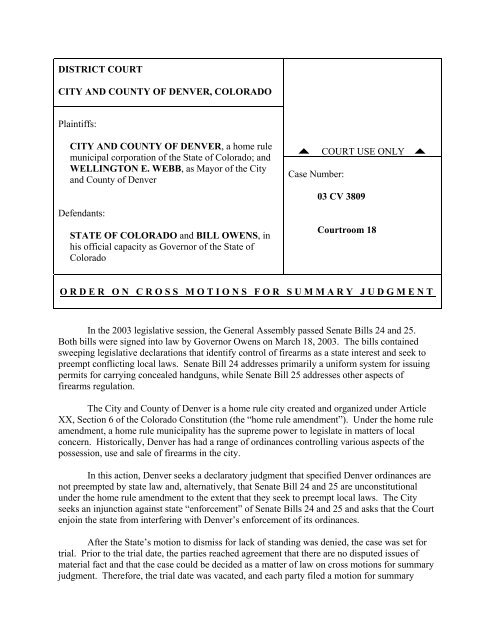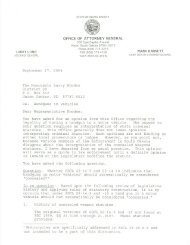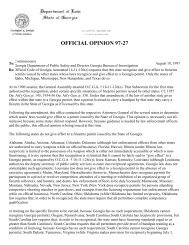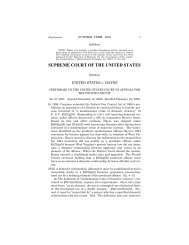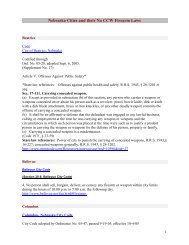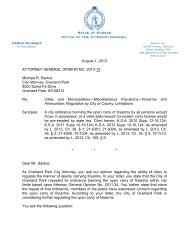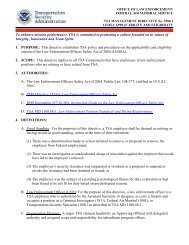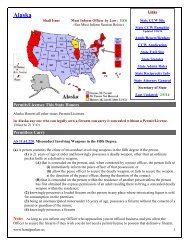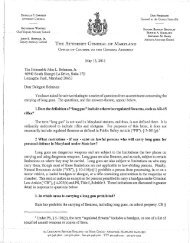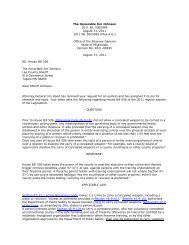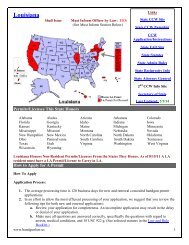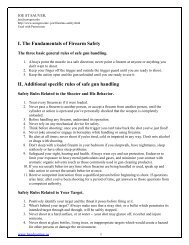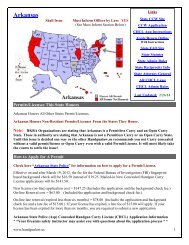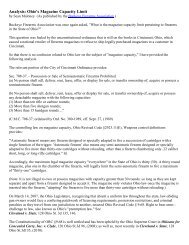City and County of Denver v. the State of Colorado
City and County of Denver v. the State of Colorado
City and County of Denver v. the State of Colorado
Create successful ePaper yourself
Turn your PDF publications into a flip-book with our unique Google optimized e-Paper software.
DISTRICT COURT<br />
CITY AND COUNTY OF DENVER, COLORADO<br />
Plaintiffs:<br />
CITY AND COUNTY OF DENVER, a home rule<br />
municipal corporation <strong>of</strong> <strong>the</strong> <strong>State</strong> <strong>of</strong> <strong>Colorado</strong>; <strong>and</strong><br />
WELLINGTON E. WEBB, as Mayor <strong>of</strong> <strong>the</strong> <strong>City</strong><br />
<strong>and</strong> <strong>County</strong> <strong>of</strong> <strong>Denver</strong><br />
Defendants:<br />
STATE OF COLORADO <strong>and</strong> BILL OWENS, in<br />
his <strong>of</strong>ficial capacity as Governor <strong>of</strong> <strong>the</strong> <strong>State</strong> <strong>of</strong><br />
<strong>Colorado</strong><br />
5<br />
COURT USE ONLY<br />
5<br />
Case Number:<br />
03 CV 3809<br />
Courtroom 18<br />
ORDER ON CROSS MOTIONS FOR SUMMARY JUDGMENT<br />
In <strong>the</strong> 2003 legislative session, <strong>the</strong> General Assembly passed Senate Bills 24 <strong>and</strong> 25.<br />
Both bills were signed into law by Governor Owens on March 18, 2003. The bills contained<br />
sweeping legislative declarations that identify control <strong>of</strong> firearms as a state interest <strong>and</strong> seek to<br />
preempt conflicting local laws. Senate Bill 24 addresses primarily a uniform system for issuing<br />
permits for carrying concealed h<strong>and</strong>guns, while Senate Bill 25 addresses o<strong>the</strong>r aspects <strong>of</strong><br />
firearms regulation.<br />
The <strong>City</strong> <strong>and</strong> <strong>County</strong> <strong>of</strong> <strong>Denver</strong> is a home rule city created <strong>and</strong> organized under Article<br />
XX, Section 6 <strong>of</strong> <strong>the</strong> <strong>Colorado</strong> Constitution (<strong>the</strong> “home rule amendment”). Under <strong>the</strong> home rule<br />
amendment, a home rule municipality has <strong>the</strong> supreme power to legislate in matters <strong>of</strong> local<br />
concern. Historically, <strong>Denver</strong> has had a range <strong>of</strong> ordinances controlling various aspects <strong>of</strong> <strong>the</strong><br />
possession, use <strong>and</strong> sale <strong>of</strong> firearms in <strong>the</strong> city.<br />
In this action, <strong>Denver</strong> seeks a declaratory judgment that specified <strong>Denver</strong> ordinances are<br />
not preempted by state law <strong>and</strong>, alternatively, that Senate Bill 24 <strong>and</strong> 25 are unconstitutional<br />
under <strong>the</strong> home rule amendment to <strong>the</strong> extent that <strong>the</strong>y seek to preempt local laws. The <strong>City</strong><br />
seeks an injunction against state “enforcement” <strong>of</strong> Senate Bills 24 <strong>and</strong> 25 <strong>and</strong> asks that <strong>the</strong> Court<br />
enjoin <strong>the</strong> state from interfering with <strong>Denver</strong>’s enforcement <strong>of</strong> its ordinances.<br />
After <strong>the</strong> <strong>State</strong>’s motion to dismiss for lack <strong>of</strong> st<strong>and</strong>ing was denied, <strong>the</strong> case was set for<br />
trial. Prior to <strong>the</strong> trial date, <strong>the</strong> parties reached agreement that <strong>the</strong>re are no disputed issues <strong>of</strong><br />
material fact <strong>and</strong> that <strong>the</strong> case could be decided as a matter <strong>of</strong> law on cross motions for summary<br />
judgment. Therefore, <strong>the</strong> trial date was vacated, <strong>and</strong> each party filed a motion for summary
judgment. Those motions have been fully briefed, <strong>and</strong> oral argument was heard on September<br />
24, 2004. As directed at oral argument, <strong>the</strong> parties have submitted supplemental filings<br />
specifying <strong>the</strong> relief <strong>the</strong>y request. The <strong>City</strong> has also tendered to <strong>the</strong> Court copies <strong>of</strong> certain<br />
amended ordinances which had not been provided earlier.<br />
The <strong>City</strong>’s complaint addressed 15 specific ordinances <strong>and</strong> two regulations. Complaint, <br />
7. One <strong>of</strong> those ordinances has since been repealed, <strong>and</strong> ano<strong>the</strong>r has been amended. The <strong>State</strong><br />
now concedes that nine ordinances <strong>and</strong> <strong>the</strong> two regulations do not conflict with state law. 1<br />
Although <strong>the</strong>y overlap to some extent, <strong>the</strong> remaining ordinances can be divided into five topical<br />
categories: (1) concealed h<strong>and</strong>guns/firearms in vehicles; (2) open carrying <strong>of</strong> firearms; (3)<br />
assault weapons/Saturday night specials; (4) safe storage/juveniles; <strong>and</strong> (5) firearms in city<br />
parks. In summary, <strong>the</strong> <strong>State</strong> argues that all <strong>of</strong> <strong>the</strong> <strong>City</strong>’s ordinances in <strong>the</strong>se areas are preempted<br />
by <strong>the</strong> <strong>State</strong>’s interest <strong>and</strong> participation in <strong>the</strong> field <strong>of</strong> firearms regulation. The <strong>City</strong>’s position is<br />
that each ordinance must be examined separately <strong>and</strong> that <strong>the</strong> disputed ordinances ei<strong>the</strong>r do not<br />
conflict with state law or address matters <strong>of</strong> purely local concern.<br />
I agree with <strong>the</strong> <strong>City</strong> that <strong>the</strong> ordinances must be examined <strong>and</strong> analyzed individually.<br />
They address disparate topics which require distinct analysis under <strong>the</strong> home rule jurisprudence<br />
<strong>of</strong> <strong>Colorado</strong>. For example, <strong>the</strong> weighing <strong>of</strong> <strong>the</strong> factors to be considered in determining whe<strong>the</strong>r a<br />
matter is <strong>of</strong> purely local, purely state or mixed concern is quite different for ordinances<br />
controlling firearms in automobiles as compared to ordinances prohibiting firearms in <strong>City</strong>owned<br />
parks. Therefore, I will address <strong>and</strong> state my conclusions with regard to each discrete<br />
area separately.<br />
HOME RULE PRINCIPLES<br />
Article XX, Section 6 <strong>of</strong> <strong>the</strong> <strong>Colorado</strong> Constitution grants home rule status to<br />
municipalities opting to adopt home-rule charters.<br />
It is <strong>the</strong> intention <strong>of</strong> this article to grant <strong>and</strong> confirm to <strong>the</strong> people <strong>of</strong> all municipalities<br />
coming within its provisions <strong>the</strong> full right <strong>of</strong> self-government in both local <strong>and</strong> municipal<br />
1 The ordinances conceded by <strong>the</strong> <strong>State</strong>, ei<strong>the</strong>r in briefing or at oral argument are as follows:<br />
§14-92, Firearms in Vehicles, Presumption <strong>of</strong> Possession<br />
§38-117(c), Display <strong>and</strong> Flourishing <strong>of</strong> Weapons<br />
§38-121, Firing <strong>and</strong> Discharge <strong>of</strong> Firearms<br />
§38-122(a) Restrictions on Display <strong>of</strong> Firearms in Store Windows<br />
§38-123, Identification <strong>and</strong> Records <strong>of</strong> Weapons Sales<br />
§38-124, Sale <strong>of</strong> Weapons to Intoxicated Persons<br />
§38-125, Reports <strong>of</strong> Gun Sales (repealed)<br />
§42-137, Security Guard Prohibited from Carrying Firearms Unless Licensed<br />
§59-80(6)(c)(1), Sale <strong>of</strong> Firearms in Residential Zone Districts (conceded at hearing)<br />
Manager <strong>of</strong> Aviation’s Rules 10.33, 20.09, 20.10, Firearms on Airport Property (conceded at hearing)<br />
Career Service Rules 15-110 <strong>and</strong> 16-50, Possession <strong>of</strong> Firearms by Employees<br />
-2-
matters <strong>and</strong> <strong>the</strong> enumeration herein <strong>of</strong> certain powers shall not be construed to deny such<br />
cities <strong>and</strong> towns, <strong>and</strong> to <strong>the</strong> people <strong>the</strong>re<strong>of</strong>, any right or power essential or proper to <strong>the</strong><br />
full exercise <strong>of</strong> such right.<br />
The statutes <strong>of</strong> <strong>the</strong> state <strong>of</strong> <strong>Colorado</strong>, so far as applicable, shall continue to apply to such<br />
cities <strong>and</strong> towns, except ins<strong>of</strong>ar as superseded by <strong>the</strong> charters <strong>of</strong> such cities <strong>and</strong> towns or<br />
by ordinance passed pursuant to such charters.<br />
Article XX, Section 6, Colo. Const.<br />
The home rule amendment, added to <strong>the</strong> Constitution in 1912, abrogated Dillon's Rule<br />
which stated that municipal corporations owe <strong>the</strong>ir origin to <strong>and</strong> derive <strong>the</strong>ir powers <strong>and</strong> rights<br />
from <strong>the</strong> legislature. The effect <strong>of</strong> <strong>the</strong> amendment was to grant home rule municipalities "every<br />
power <strong>the</strong>ret<strong>of</strong>ore possessed by <strong>the</strong> legislature to authorize municipalities to function in local <strong>and</strong><br />
municipal affairs." <strong>City</strong> <strong>and</strong> <strong>County</strong> <strong>of</strong> <strong>Denver</strong> v. <strong>State</strong>, 788 P.2d 764, 767 (Colo. 1990) (quoting<br />
Four-<strong>County</strong> Metro. Capital Improvement Dist. v. Board <strong>of</strong> <strong>County</strong> Comm'rs., 369 P.2d 67,72<br />
(Colo. 1962)). Although <strong>the</strong> legislature continues to exercise supreme authority over matters <strong>of</strong><br />
statewide concern, a home rule city is not inferior to <strong>the</strong> General Assembly with respect to local<br />
matters.<br />
In determining <strong>the</strong> relative authority between <strong>the</strong> General Assembly <strong>and</strong> home rule<br />
municipalities <strong>the</strong>re are three broad categories <strong>of</strong> regulatory matters to consider: 1) matters <strong>of</strong><br />
local concern; 2) matters <strong>of</strong> statewide concern; <strong>and</strong> 3) matters <strong>of</strong> mixed local <strong>and</strong> statewide<br />
concern. Id.; Trinen v. <strong>City</strong> <strong>and</strong> <strong>County</strong> <strong>of</strong> <strong>Denver</strong>, 53 P.3d 754, 758-759 (Colo. App. 2002);<br />
<strong>City</strong> <strong>of</strong> Commerce <strong>City</strong> v. <strong>State</strong>, 40 P.3d 1273, 1279-1280 (Colo. 2002); <strong>City</strong> <strong>and</strong> <strong>County</strong> <strong>of</strong><br />
<strong>Denver</strong> v. Qwest Corp., 18 P.3d 748, 754 (Colo. 2001). These categories are described in more<br />
detail below.<br />
In matters <strong>of</strong> local concern, a home rule municipality has plenary authority. Qwest Corp.,<br />
18 P.3d at 754. While <strong>the</strong> state may legislate in areas <strong>of</strong> local concern, see <strong>City</strong> <strong>and</strong> <strong>County</strong> <strong>of</strong><br />
<strong>Denver</strong> v. <strong>State</strong>, 788 P.2d at 767 (Colo. 1990), home rule ordinances or regulations control in <strong>the</strong><br />
event <strong>of</strong> a conflict with state legislation. Id.; <strong>City</strong> <strong>of</strong> Commerce <strong>City</strong>, 40 P.3d at 1279; <strong>City</strong> <strong>and</strong><br />
<strong>County</strong> <strong>of</strong> <strong>Denver</strong> v. <strong>State</strong>, 788 P.2d at 767. By contrast, <strong>the</strong> General Assembly has exclusive<br />
authority to legislate in areas <strong>of</strong> statewide concern. That is, <strong>the</strong> state legislature may adopt<br />
legislation, <strong>and</strong> home rule municipalities are without power to act unless authorized by <strong>the</strong><br />
constitution or by state law. See, Trinen, 53 P.3d at 758; Qwest Corp., 18 P.3d at 754; <strong>City</strong> <strong>and</strong><br />
<strong>County</strong> <strong>of</strong> <strong>Denver</strong> v. <strong>State</strong>, 788 P.2d at 767. If <strong>the</strong> matter is one <strong>of</strong> mixed local <strong>and</strong> statewide<br />
concern, home rule provisions <strong>and</strong> state statutes may coexist when <strong>the</strong> measures can be<br />
harmonized. In <strong>the</strong> event <strong>of</strong> a conflict, however, <strong>the</strong> state statute supersedes <strong>the</strong> home rule<br />
provision. Trinen, 53 P.3d at 758; Qwest Corp., 18 P.3d at 754; Town <strong>of</strong> Telluride v. Lot Thirty-<br />
Four Venture LLC, 3 P.3d 30, 37 (Colo. 2000); <strong>City</strong> <strong>and</strong> <strong>County</strong> <strong>of</strong> <strong>Denver</strong> v. <strong>State</strong>, 788 P.2d at<br />
767. Even when a home rule city has considerable local interests at stake, a particular issue may<br />
be characterized as one <strong>of</strong> mixed concern for purposes <strong>of</strong> determining a home rule municipality's<br />
authority when sufficient state interests also are implicated. Town <strong>of</strong> Telluride, 3 P.3d at 37; but<br />
see J. Coats dissent in <strong>City</strong> <strong>of</strong> Northglenn v. Ibarra, 62 P.3d 151,165 (Colo. 2003)(<strong>the</strong> General<br />
Assembly cannot make a matter <strong>of</strong> local concern any less so by imposing its own regulatory<br />
scheme, even where it has legitimate statewide concerns).<br />
-3-
Therefore, determining whe<strong>the</strong>r <strong>the</strong> state laws enacted by Senate Bills 24 <strong>and</strong> 25 preempt<br />
<strong>the</strong> disputed <strong>Denver</strong> ordinances depends on whe<strong>the</strong>r <strong>the</strong>y address matters <strong>of</strong> local, statewide, or<br />
mixed local <strong>and</strong> statewide concern. The <strong>Colorado</strong> Supreme Court has repeatedly announced<br />
certain tests to determine whe<strong>the</strong>r a matter is local, state or mixed. These categories, however,<br />
are not mutually exclusive. They do not provide perfectly distinct descriptions <strong>of</strong> competing<br />
governmental interests. They <strong>of</strong>ten merge imperceptibly, <strong>City</strong> <strong>and</strong> <strong>County</strong> <strong>of</strong> <strong>Denver</strong> v. <strong>State</strong>,<br />
788 P.2d at 767, <strong>the</strong>reby making <strong>the</strong> tests for identifying <strong>the</strong> category imprecise <strong>and</strong> easier to<br />
state than to apply. The tests include:<br />
Totality <strong>of</strong> <strong>the</strong> Circumstances<br />
To determine whe<strong>the</strong>r a state or home rule municipality's rules govern, <strong>the</strong> Court must<br />
consider <strong>the</strong> totality <strong>of</strong> <strong>the</strong> circumstances to make its conclusion that a particular subject matter is<br />
one <strong>of</strong> local, statewide, or mixed concern. <strong>City</strong> <strong>of</strong> Commerce <strong>City</strong>, 40 P.3d at 1279-1280; Town<br />
<strong>of</strong> Telluride, 3 P.3d at 37. This analysis involves consideration <strong>of</strong> both fact <strong>and</strong> policy, Qwest<br />
Corp., 18 P.3d at 754-755, directed toward weighing <strong>the</strong> respective state <strong>and</strong> local interests<br />
implicated by law. Town <strong>of</strong> Telluride, 3 P.3d at 37. The determination is ad hoc, taking into<br />
consideration <strong>the</strong> facts <strong>of</strong> each case. <strong>City</strong> <strong>and</strong> <strong>County</strong> <strong>of</strong> <strong>Denver</strong> v. <strong>State</strong>, 788 P.2d at 767-768.<br />
Legislative Declarations<br />
The General Assembly's declaration that an issue is a matter <strong>of</strong> statewide or local concern<br />
is not conclusive, but should be afforded deference in recognition <strong>of</strong> <strong>the</strong> legislature's authority to<br />
declare public policy <strong>of</strong> <strong>the</strong> state in matters <strong>of</strong> statewide concern. Town <strong>of</strong> Telluride, 3 P.3d at<br />
37 (citing <strong>City</strong> <strong>and</strong> <strong>County</strong> <strong>of</strong> <strong>Denver</strong> v. <strong>State</strong>, 788 P.2d at 768 n. 6 (noting that General<br />
Assembly's declaration is not binding)). It is not up to <strong>the</strong> courts to make or weigh policies. Id.<br />
at 38. Thus, when sufficient state interests are implicated, an issue that also implicates local<br />
interests is still a matter <strong>of</strong> mixed local <strong>and</strong> statewide concern. Id.<br />
Key Factors<br />
Finally, in determining whe<strong>the</strong>r a state interest is sufficient to justify home rule<br />
preemption, a variety <strong>of</strong> factors should be considered. These factors are intended to assist <strong>the</strong><br />
Court in measuring <strong>the</strong> importance <strong>of</strong> <strong>the</strong> state interests against <strong>the</strong> importance <strong>of</strong> <strong>the</strong> local<br />
interests in order to make an ad hoc decision as to which law should prevail. They include: 1)<br />
<strong>the</strong> need for statewide uniformity <strong>of</strong> regulation; 2) <strong>the</strong> impact <strong>of</strong> <strong>the</strong> measure on individuals<br />
living outside <strong>the</strong> municipality (extraterritorial impact); 3) historical considerations concerning<br />
whe<strong>the</strong>r <strong>the</strong> subject matter is one traditionally governed by state or local government; 4) whe<strong>the</strong>r<br />
<strong>the</strong> <strong>Colorado</strong> Constitution specifically commits <strong>the</strong> particular matter to state or local regulation;<br />
<strong>and</strong> 5) whe<strong>the</strong>r <strong>the</strong>re is a need for governmental cooperation to facilitate <strong>the</strong> laws concerning <strong>the</strong><br />
subject matter in question. <strong>City</strong> <strong>of</strong> Northglenn, 62 P.3d at 156; <strong>City</strong> <strong>of</strong> Commerce <strong>City</strong>, 40 P.3d<br />
at 1280; <strong>City</strong> <strong>and</strong> <strong>County</strong> <strong>of</strong> <strong>Denver</strong> v. Qwest, Corp.,18 P.3d at 754-55; Town <strong>of</strong> Telluride, 3<br />
P.3d at 37; <strong>City</strong> <strong>and</strong> <strong>County</strong> <strong>of</strong> <strong>Denver</strong> v. <strong>State</strong>, 788 P.2d at 768.<br />
The parties agree that regulation <strong>of</strong> firearms is generally a matter <strong>of</strong> mixed concern. See<br />
Plaintiff’s Response to Defendants' Motion at p. 2; Defendants' Motion for Summary Judgment<br />
at pp. 5-6. In Trinen v. <strong>City</strong> <strong>and</strong> <strong>County</strong> <strong>of</strong> <strong>Denver</strong>, 53 P.3d 754 (Colo. App. 2002), which<br />
upheld as constitutional a former version <strong>of</strong> <strong>the</strong> <strong>City</strong>’s ordinance concerning firearms in vehicles,<br />
-4-
<strong>the</strong> parties agreed that <strong>the</strong> matter was <strong>of</strong> mixed local <strong>and</strong> state concern. However, <strong>the</strong> <strong>City</strong> argues<br />
in this case that <strong>the</strong> specific ordinances at issue here address matters <strong>of</strong> strictly local concern<br />
where <strong>the</strong> <strong>City</strong>’s interests should outweigh <strong>the</strong> insubstantial state interests shown. This<br />
highlights <strong>the</strong> need to analyze each separate ordinance individually.<br />
PREEMPTION PRINCIPLES<br />
If a matter is <strong>of</strong> mixed concern, <strong>the</strong> next inquiry is whe<strong>the</strong>r <strong>the</strong> local <strong>and</strong> state laws are in<br />
conflict, or whe<strong>the</strong>r <strong>the</strong>y can be read harmoniously to effectuate <strong>the</strong> interests <strong>of</strong> both<br />
governments. See Trinen, 53 P.3d at 758. Conflicts between local <strong>and</strong> state laws may arise ei<strong>the</strong>r<br />
expressly or by mere implication. Express conflicts exist when an ordinance or local regulation<br />
authorizes what state legislation forbids or forbids what state legislation authorizes. <strong>City</strong> <strong>of</strong><br />
Commerce <strong>City</strong>, 40 P.3d at 1284. An implied conflict arises when a local ordinance <strong>and</strong> a state<br />
law prevent each o<strong>the</strong>r from effectuating <strong>the</strong>ir purposes without necessarily legislating on <strong>the</strong><br />
same subject matter. See e.g., <strong>City</strong> <strong>of</strong> Northglenn, 62 P.3d at 156; Town <strong>of</strong> Telluride, 3 P.3d at<br />
37. Should a home rule ordinance or regulation conflict with state law in an area <strong>of</strong> mixed<br />
concern, <strong>the</strong> local law will be preempted.<br />
Although state laws prevail in <strong>the</strong> event <strong>of</strong> a conflict in an area <strong>of</strong> mixed concern, courts<br />
should first look to determine whe<strong>the</strong>r <strong>the</strong> ordinance <strong>and</strong> state law can coexist. Underst<strong>and</strong>ing<br />
that laws must be read to accomplish <strong>the</strong> purpose for which <strong>the</strong>y were enacted, courts must<br />
examine <strong>the</strong> context <strong>of</strong> <strong>the</strong> legislation to determine whe<strong>the</strong>r <strong>the</strong> local <strong>and</strong> state laws can be<br />
harmonized in an area <strong>of</strong> mixed local <strong>and</strong> statewide concern. This includes, but is not limited to,<br />
examining <strong>the</strong> title <strong>of</strong> <strong>the</strong> specific statute, <strong>the</strong> language <strong>of</strong> its provisions <strong>and</strong> its statement <strong>of</strong><br />
purpose. Trinen, 53 P.3d at 759.<br />
It is noted that <strong>the</strong> <strong>State</strong>'s interest in regulation <strong>of</strong> firearms is based in part on a desire to<br />
protect <strong>the</strong> constitutional right <strong>of</strong> a person to keep <strong>and</strong> bear arms. See C.R.S. §§ 18-12-201(e),<br />
29-11.7-101(a)(b) (2003). This right, however, is not absolute <strong>and</strong> does not automatically<br />
preempt firearm regulation. Contrary to <strong>the</strong> declarations in Senate Bill 25, <strong>the</strong> right to bear arms<br />
has not been held by <strong>the</strong> courts to be a fundamental right. See Trinen, 53 P.3d at 757 (citing<br />
People v. Young, 859 P.2d 814 (Colo. 1993)). Moreover, <strong>the</strong> right is specifically limited where<br />
<strong>the</strong> constitutional provision states that "nothing herein contained shall be construed to justify <strong>the</strong><br />
practice <strong>of</strong> carrying concealed weapons." See Art. II, §13, Colo. Const. Firearm regulations<br />
promulgated by <strong>the</strong> <strong>State</strong> or a local municipality under <strong>the</strong> home rule amendment may coexist<br />
with <strong>the</strong> constitutional right to keep <strong>and</strong> bear arms so long as such regulations are a reasonable<br />
exercise <strong>of</strong> <strong>the</strong> governments' police powers. See, e.g., Robertson v. <strong>City</strong> <strong>and</strong> <strong>County</strong> <strong>of</strong> <strong>Denver</strong>,<br />
874 P. 2d 325 (Colo. 1994) (upholding <strong>Denver</strong>’s assault weapons ban); Trinen, 53 P. 3d 754;<br />
People v. Pflugbeil, 834 P.2d 843 (Colo. App. 1992) (order depriving mental patient <strong>of</strong> right to<br />
weapons).<br />
Recognizing <strong>the</strong>se general principles, I now turn to <strong>the</strong> five subject areas remaining in<br />
dispute.<br />
-5-
CONCEALED HANDGUNS/FIREARMS IN VEHICLES<br />
Senate Bill 24 establishes statewide uniform st<strong>and</strong>ards for issuance <strong>of</strong> permits for <strong>the</strong><br />
carrying <strong>of</strong> concealed h<strong>and</strong>guns. C.R.S. §18-12-201 et. seq. (2003) The <strong>City</strong> does not challenge<br />
that aspect <strong>of</strong> <strong>the</strong> bill <strong>and</strong> has amended its ordinances accordingly. However, <strong>the</strong> bill also<br />
addresses where a permit holder may carry a concealed h<strong>and</strong>gun <strong>and</strong> when h<strong>and</strong>guns may be<br />
carried without a permit. The <strong>City</strong> contends that its ordinances on <strong>the</strong>se topics should not be<br />
preempted. There are two subsets <strong>of</strong> issues in this category, but <strong>the</strong>y must be treated toge<strong>the</strong>r<br />
since <strong>the</strong> statutes <strong>and</strong> ordinances are intertwined: (1) where concealed h<strong>and</strong>guns may be carried<br />
with a permit; <strong>and</strong> (2) having firearms in automobiles without a permit.<br />
In general, both state law <strong>and</strong> <strong>Denver</strong>’s ordinances prohibit carrying a concealed h<strong>and</strong>gun<br />
without a permit unless <strong>the</strong> gun is in an automobile or being used for hunting. However, <strong>the</strong><br />
differences in <strong>the</strong> details between state <strong>and</strong> local laws apparently give rise to <strong>the</strong> dispute between<br />
<strong>the</strong> parties in this area.<br />
Section 38-117(a) <strong>of</strong> <strong>the</strong> <strong>Denver</strong> Revised Municipal Code (“DRMC”) provides:<br />
It shall be unlawful for any person, except a law enforcement<br />
<strong>of</strong>ficer in <strong>the</strong> performance <strong>of</strong> duty, to wear under <strong>the</strong>ir clo<strong>the</strong>s, or<br />
concealed about <strong>the</strong>ir person any dangerous or deadly weapon,<br />
including, but not by way <strong>of</strong> limitation, any pistol, revolver, rifle,<br />
shotgun . . . or o<strong>the</strong>r dangerous or deadly weapon.<br />
As amended on July 12, 2004, subsection (f) <strong>of</strong> § 38-117 provides that it is not an <strong>of</strong>fense if <strong>the</strong><br />
person carrying <strong>the</strong> concealed weapon holds a valid permit <strong>and</strong> is carrying <strong>the</strong> h<strong>and</strong>gun in<br />
compliance with state or local law. Subsection (f) also provides that it is not an <strong>of</strong>fense if:<br />
The person is carrying <strong>the</strong> weapon concealed within a private<br />
automobile or o<strong>the</strong>r private means <strong>of</strong> conveyance, for hunting or<br />
for lawful protection <strong>of</strong> such person’s or ano<strong>the</strong>r person’s person<br />
or property, while traveling into or through <strong>the</strong> city to or from<br />
ano<strong>the</strong>r jurisdiction, regardless <strong>of</strong> <strong>the</strong> number <strong>of</strong> times <strong>the</strong> person<br />
stops in <strong>the</strong> city or <strong>the</strong> o<strong>the</strong>r jurisdiction, <strong>and</strong> <strong>the</strong> weapon is not an<br />
explosive device, incendiary device, or a bomb.<br />
DRMC §38-118 supplies affirmative defenses to charges brought under §38-117(a) if <strong>the</strong><br />
weapon is carried by a person:<br />
(1) In a private automobile or o<strong>the</strong>r private means <strong>of</strong><br />
conveyance for lawful protection <strong>of</strong> <strong>the</strong>ir or ano<strong>the</strong>r’s<br />
person or property, when <strong>the</strong>re is a direct <strong>and</strong> immediate<br />
threat <strong>the</strong>reto, while traveling away from <strong>the</strong> area <strong>of</strong> <strong>the</strong>ir<br />
residence or business;<br />
-6-
(2) In <strong>the</strong>ir own dwelling, or place <strong>of</strong> business, or on property<br />
owned or under <strong>the</strong>ir control at <strong>the</strong> time <strong>of</strong> <strong>the</strong> act <strong>of</strong><br />
carrying such weapon. . . .<br />
As enacted by Senate Bill 24, C.R.S. §18-12-204(2)(a) (2003) states that “a permittee, in<br />
compliance with <strong>the</strong> terms <strong>of</strong> a permit, may carry a concealed h<strong>and</strong>gun as allowed by state law.”<br />
C.R.S. §18-12-204(3)(a) provides that:<br />
A person who may lawfully possess a h<strong>and</strong>gun may carry a<br />
h<strong>and</strong>gun under <strong>the</strong> following circumstances without obtaining a<br />
permit <strong>and</strong> <strong>the</strong> h<strong>and</strong>gun shall not be considered concealed:<br />
(I)<br />
(II)<br />
The h<strong>and</strong>gun is in <strong>the</strong> possession <strong>of</strong> a person who is in a<br />
private automobile or in some o<strong>the</strong>r private means <strong>of</strong><br />
conveyance <strong>and</strong> who carries <strong>the</strong> h<strong>and</strong>gun for a legal use,<br />
including self defense; or<br />
The h<strong>and</strong>gun is in <strong>the</strong> possession <strong>of</strong> a person who is legally<br />
engaged in hunting activities within <strong>the</strong> state.<br />
In C.R.S. §18-12-214(1)(a) (2003), also added by Senate Bill 24, state law authorizes a<br />
person with a permit to carry a concealed h<strong>and</strong>gun in “all areas <strong>of</strong> <strong>the</strong> state, except as specifically<br />
limited in this section . . . a local government does not have authority to adopt or enforce an<br />
ordinance or resolution that would conflict with any provision <strong>of</strong> this part 2.” In subsection (2),<br />
that statute provides that a permit for a concealed h<strong>and</strong>gun does not authorize <strong>the</strong> permittee to<br />
carry <strong>the</strong> concealed h<strong>and</strong>gun into a place where <strong>the</strong> carrying <strong>of</strong> firearms is prohibited by federal<br />
law, on public school property or in a public building with security personnel <strong>and</strong> electronic<br />
weapons screening devices in place <strong>and</strong> operational. O<strong>the</strong>rwise, state law, like <strong>the</strong> <strong>Denver</strong><br />
ordinance, prohibits <strong>the</strong> carrying <strong>of</strong> a concealed h<strong>and</strong>gun without a permit, with few exceptions.<br />
C.R.S. §18-12-105(1) <strong>and</strong> (2) (2003).<br />
Generally, <strong>the</strong> parties agree that <strong>the</strong> matter <strong>of</strong> concealed carry <strong>of</strong> firearms is one <strong>of</strong> mixed<br />
local <strong>and</strong> state concern. See Plaintiffs’ Response to Defendants' Motion for Summary Judgment<br />
at p. 2; Defendants' Motion for Summary Judgment at pp. 5-6. As stated above, in a mixed area,<br />
a local ordinance can exist alongside a state statute as long as <strong>the</strong>re is no conflict between <strong>the</strong>m.<br />
The <strong>City</strong> argues that <strong>the</strong>re is no conflict between its ordinances, as amended, <strong>and</strong> <strong>the</strong> <strong>State</strong><br />
statutes on concealed carrying. The <strong>State</strong> responds that <strong>the</strong> <strong>City</strong>’s affirmative defense <strong>of</strong> selfdefense<br />
is more restrictive than <strong>the</strong> <strong>State</strong> statute because it requires that <strong>the</strong> person with <strong>the</strong> gun<br />
be under a “direct <strong>and</strong> immediate threat.” The <strong>State</strong> also argues that <strong>the</strong> <strong>City</strong>’s ordinance, even<br />
as amended, allows for a future conflict where it states that a permittee has not committed an<br />
<strong>of</strong>fense as long as he or she is “carrying a h<strong>and</strong>gun in conformance with any applicable state or<br />
local law.” DRMC §38-117(f)(1). The <strong>State</strong> postulates that <strong>the</strong> <strong>City</strong> in <strong>the</strong> future may pass a<br />
local law prohibiting permittees from carrying concealed weapons into <strong>City</strong> buildings even<br />
where <strong>the</strong>re are no security personnel or metal detectors.<br />
-7-
I agree with <strong>the</strong> <strong>State</strong> in part. The <strong>State</strong>'s interest in <strong>the</strong> concealed carry <strong>of</strong> firearms is<br />
significant. The <strong>State</strong> has historically regulated <strong>the</strong> lawful carry <strong>of</strong> concealed weapons, see<br />
C.R.S. §18-12-105, <strong>and</strong> through Senate Bill 24 (C.R.S. §§18-12-201 et. seq.), it stepped in to<br />
provide a comprehensive permitting scheme for <strong>the</strong> lawful possession <strong>of</strong> concealed h<strong>and</strong>guns<br />
throughout <strong>Colorado</strong>. The city effectively acquiesced to <strong>the</strong> <strong>State</strong>'s authority in this area by its<br />
decision not to challenge <strong>the</strong> state’s imposition <strong>of</strong> uniform permitting st<strong>and</strong>ards <strong>and</strong> by its repeal<br />
or modification <strong>of</strong> ordinances that expressly conflicted with <strong>the</strong> new state law. Thus, state law<br />
now provides <strong>the</strong> overriding authority concerning concealed carry <strong>of</strong> h<strong>and</strong>guns <strong>and</strong> establishes a<br />
degree <strong>of</strong> uniformity for obtaining permits <strong>and</strong> identifying those instances when a permit is not<br />
required. This legislation enables a permit holder to have consistent expectations about <strong>the</strong><br />
lawful possession <strong>of</strong> concealed h<strong>and</strong>guns when present anywhere in <strong>the</strong> state. Accord, <strong>City</strong> <strong>of</strong><br />
Commerce <strong>City</strong>, 40 P.3d at 1281 (state's baseline regulations for automated ticketing procedures<br />
provided needed degree <strong>of</strong> uniformity that allowed citizens to develop basic expectations about<br />
how <strong>the</strong>y will be ticketed). This appears to be <strong>the</strong> ultimate purpose <strong>of</strong> <strong>the</strong> permitting scheme <strong>and</strong><br />
Senate Bill 24.<br />
In this context, <strong>the</strong> <strong>City</strong>’s argument that §38-117(f) should survive because it seeks to<br />
prohibit carrying a concealed weapon without a permit only in vehicles used strictly for local<br />
travel is unavailing. At argument, <strong>the</strong> <strong>City</strong>’s counsel confessed that such a restriction presents a<br />
virtually insurmountable enforcement problem anyway. Moreover, C.R.S. §18-12-105.6 was<br />
amended by Senate Bill 25 to permit carrying a weapon in a private automobile for hunting or<br />
self defense “within a jurisdiction.” This is in direct conflict with §38-117(f)(2) which would<br />
prohibit carrying a weapon in an automobile while traveling entirely within <strong>the</strong> <strong>City</strong> <strong>and</strong> <strong>County</strong><br />
<strong>of</strong> <strong>Denver</strong>.<br />
Given <strong>the</strong> <strong>State</strong>'s detailed regulatory scheme for concealed carry <strong>of</strong> h<strong>and</strong>guns, I find <strong>and</strong><br />
conclude that <strong>the</strong> portion <strong>of</strong> DRMC §38-117(f)(2) which reads “while traveling into or through<br />
<strong>the</strong> city to or from ano<strong>the</strong>r jurisdiction, regardless <strong>of</strong> <strong>the</strong> number <strong>of</strong> times <strong>the</strong> person stops in <strong>the</strong><br />
city or <strong>the</strong> o<strong>the</strong>r jurisdiction” is in conflict with state law <strong>and</strong> is preempted by state law. Fur<strong>the</strong>r,<br />
I find that DRMC §38-118(a)(1) is in conflict with state law where it includes <strong>the</strong> phrase “when<br />
<strong>the</strong>re is a direct <strong>and</strong> immediate threat <strong>the</strong>reto.” In all o<strong>the</strong>r respects, <strong>the</strong> <strong>City</strong>’s ordinances, as<br />
amended, do not conflict with state law in this area <strong>and</strong> may coexist with state law.<br />
I reject <strong>the</strong> <strong>State</strong>’s argument that including “local law” in DRMC §38-117(f) creates a<br />
conflict with state law. The potential that <strong>the</strong> <strong>City</strong> might, sometime in <strong>the</strong> future, pass a local<br />
law in conflict with state statutes is not a reason to invalidate <strong>the</strong> ordinance now. A local law<br />
passed in <strong>the</strong> future may be read to harmonize with <strong>the</strong> state regulatory scheme. Any specific<br />
local law will need to be evaluated in context if <strong>and</strong> when it is enacted in <strong>the</strong> future.<br />
The o<strong>the</strong>r conflict pointed out by <strong>the</strong> <strong>State</strong> is that state law allows guns carried lawfully in<br />
automobiles to be loaded or unloaded whereas <strong>the</strong> city ordinances require that <strong>the</strong>y be unloaded<br />
except when carried for self-defense. Compare C.R.S. §§18-12-204 <strong>and</strong> 214 with DMRC §38-<br />
118(b) (3) <strong>and</strong> (4). However, <strong>the</strong> cited ordinance applies to open carry <strong>of</strong> firearms, not<br />
concealed carry without a permit. Since I conclude below that regulation <strong>of</strong> open carry is a<br />
matter <strong>of</strong> local concern, that ordinance is not preempted by <strong>the</strong> state’s concealed carry statutes.<br />
-8-
OPEN CARRYING OF FIREARMS<br />
Section 38-117(b) <strong>of</strong> <strong>the</strong> <strong>Denver</strong> Revised Municipal Code makes it unlawful for any<br />
person “to carry, use or wear any dangerous or deadly weapon, including, but not by way <strong>of</strong><br />
limitation, any pistol, revolver, rifle, shotgun . . . or any o<strong>the</strong>r dangerous or deadly weapon.” It is<br />
not an <strong>of</strong>fense if <strong>the</strong> person has a permit <strong>and</strong> is carrying a concealed h<strong>and</strong>gun or if <strong>the</strong> person is<br />
carrying <strong>the</strong> weapon in a private automobile for hunting or self defense. Section 38-117(f)(1)<br />
<strong>and</strong> (2). Affirmative defenses to a charge <strong>of</strong> openly carrying a firearm are listed in §38-118(a)<br />
<strong>and</strong> (b) <strong>and</strong> include carrying <strong>the</strong> weapon in a person’s own dwelling, place <strong>of</strong> business or own<br />
property, carrying <strong>the</strong> weapon in defense <strong>of</strong> home, person or property when <strong>the</strong>re is a direct <strong>and</strong><br />
immediate threat, for use on a hunting trip or target shooting, transportation as a collector or<br />
licensed dealer, <strong>and</strong> moving personal property from an old residence to a new residence.<br />
<strong>State</strong> law contains no restriction on <strong>the</strong> open carrying <strong>of</strong> firearms, nor does state law<br />
expressly permit <strong>the</strong> open carrying <strong>of</strong> firearms. In Senate Bill 25, <strong>the</strong> legislature enacted C.R.S.<br />
§29-11.7-103 (2003) which purports to be a broad preemption <strong>of</strong> all local gun laws which are<br />
more restrictive than state law:<br />
Regulation -- type <strong>of</strong> firearm -- prohibited. A local government<br />
may not enact an ordinance, regulation, or o<strong>the</strong>r law that prohibits<br />
<strong>the</strong> sale, purchase, or possession <strong>of</strong> a firearm that a person may<br />
lawfully sell, purchase, or possess under state or federal law. Any<br />
such ordinance, regulation, or o<strong>the</strong>r law enacted by a local<br />
government prior to <strong>the</strong> effective date <strong>of</strong> this section is void <strong>and</strong><br />
unenforceable.<br />
Also included in Senate Bill 25 was a provision stating that a local government may enact an<br />
ordinance prohibiting <strong>the</strong> open carrying <strong>of</strong> a firearm in a building or specific area as long as<br />
signs are posted at <strong>the</strong> public entrances to <strong>the</strong> building or specific area. C.R.S. §29-11.7-104<br />
(2003).<br />
The <strong>City</strong> argues that its ordinance regulates open carrying <strong>of</strong> firearms but does not<br />
prohibit it <strong>and</strong> is <strong>the</strong>refore not in conflict with state law. Alternatively, <strong>the</strong> <strong>City</strong> argues that open<br />
carrying <strong>of</strong> firearms is a matter <strong>of</strong> purely local concern in that <strong>the</strong> unique circumstances <strong>of</strong><br />
<strong>Denver</strong> make its local interests far outweigh any state interest in allowing open carrying <strong>of</strong> guns.<br />
The <strong>State</strong> argues that <strong>the</strong> open carrying <strong>of</strong> firearms is a mixed state <strong>and</strong> local issue, that<br />
<strong>the</strong> <strong>State</strong> has preempted <strong>the</strong> field by enacting C.R.S. §29-11.7-103 <strong>and</strong> that <strong>the</strong> <strong>City</strong> has <strong>the</strong><br />
option <strong>of</strong> protecting its local interests by posting signs as allowed in C.R.S. §29-11.7-104.<br />
I reject <strong>the</strong> <strong>City</strong>’s argument on statutory construction. Although <strong>the</strong> legislative history<br />
lends some support to <strong>the</strong> position, <strong>the</strong> plain language <strong>of</strong> C.R.S. §29-11.7-103 is clear <strong>and</strong><br />
unambiguous. Under <strong>the</strong>se circumstances, a court should not resort to legislative history. Town<br />
<strong>of</strong> Telluride, 3 P.3d at 37. To hold that <strong>the</strong> ordinance only regulates <strong>the</strong> open carrying <strong>of</strong><br />
-9-
firearms when on its face, it prohibits such open carrying except in certain limited circumstances,<br />
would be an unnatural construction <strong>of</strong> both <strong>the</strong> statute <strong>and</strong> <strong>the</strong> ordinance.<br />
However, I agree with <strong>the</strong> <strong>City</strong>’s argument that open carrying is a matter <strong>of</strong> purely local<br />
concern, at least ins<strong>of</strong>ar as <strong>Denver</strong> is concerned. <strong>Denver</strong> is by far <strong>the</strong> most densely populated<br />
area <strong>of</strong> <strong>Colorado</strong>. See Appendix B to Plaintiffs’ Brief in Support <strong>of</strong> Motion for Summary<br />
Judgment. <strong>Denver</strong> also suffers rates <strong>of</strong> violent crime far in excess <strong>of</strong> statewide averages. Id.,<br />
Appendix C. These unique factors predominate over any need for statewide uniformity or any<br />
concern about extraterritorial impact. Uniformity in itself is no virtue, <strong>Denver</strong> v. <strong>State</strong>, at 769,<br />
<strong>and</strong> uniformity in this area seems to have diminished value due to <strong>the</strong> wide diversity <strong>of</strong> localities<br />
included in <strong>Colorado</strong>. As plaintiffs stated in <strong>the</strong>ir opening brief: “Simply put, a bullet fired in<br />
<strong>Denver</strong>—whe<strong>the</strong>r maliciously by a criminal or negligently by a law-abiding citizen—is more<br />
likely to hit something or somebody than a bullet fired in rural <strong>Colorado</strong>.”<br />
Unlike <strong>the</strong> legislation for concealed carry, Senate Bill 25 fails to set forth a<br />
comprehensive regulatory scheme that serves as uniform authority for open carry <strong>of</strong> firearms.<br />
Also, unlike transportation <strong>of</strong> concealed weapons in automobiles, it should be relatively simple<br />
for a gun owner to recall that he or she may not carry a sidearm openly in downtown <strong>Denver</strong> as<br />
is possible in rural <strong>Colorado</strong>. History is also on <strong>the</strong> side <strong>of</strong> <strong>the</strong> local ordinance. Since 1973,<br />
<strong>Denver</strong> has regulated <strong>the</strong> open carrying <strong>of</strong> firearms in public. The <strong>State</strong> has been silent on <strong>the</strong><br />
topic until Senate Bill 25. The <strong>Colorado</strong> Constitution, while protecting <strong>the</strong> right to bear arms,<br />
does not specifically commit regulation <strong>of</strong> open carrying <strong>of</strong> firearms to ei<strong>the</strong>r state or local<br />
government. Finally, <strong>the</strong>re is no apparent need for governmental cooperation to facilitate laws in<br />
this area. <strong>City</strong> <strong>of</strong> Northglenn, 62 P.3d at 156. Based on <strong>the</strong> totality <strong>of</strong> <strong>the</strong> circumstances, I<br />
conclude that <strong>the</strong> <strong>State</strong>’s interest in allowing <strong>the</strong> general open carry <strong>of</strong> firearms is insubstantial<br />
<strong>and</strong> is far outweighed by <strong>Denver</strong>’s local interest in regulating firearms more strictly in an<br />
urbanized area. Where <strong>the</strong> <strong>State</strong>’s interest is insubstantial, a matter may be deemed one <strong>of</strong><br />
exclusively local concern for purposes <strong>of</strong> home rule analysis. <strong>City</strong> <strong>and</strong> <strong>County</strong> <strong>of</strong> <strong>Denver</strong> v.<br />
<strong>State</strong>, 788 P.2d at 771.<br />
I reach this conclusion despite <strong>the</strong> strong declarations <strong>of</strong> statewide interest in regulating<br />
firearms provided in Senate Bill 25. See C.R.S. 29-11.7-101 (2003). While such declarations<br />
should be afforded deference in recognition <strong>of</strong> <strong>the</strong> legislature's authority to declare public policy,<br />
<strong>the</strong>y are not binding. Without more, declarations <strong>of</strong> <strong>the</strong> General Assembly do not clearly<br />
establish <strong>the</strong> significance <strong>of</strong> <strong>the</strong> <strong>State</strong>'s interest in regulating open carry <strong>of</strong> firearms. Relying on<br />
<strong>the</strong> declarations alone to demonstrate <strong>the</strong> statewide interest would render <strong>the</strong> home rule<br />
amendment meaningless. The home rule amendment makes home rule municipalities superior to<br />
<strong>the</strong> General Assembly with respect to local matters. For this constitutional scheme to have any<br />
vitality, <strong>the</strong> General Assembly must do more than simply declare an interest in a regulatory<br />
matter. It must also demonstrate its interest through actual legislation related to that subject<br />
matter. O<strong>the</strong>rwise, home rule control <strong>of</strong> what has traditionally been a local matter could be<br />
usurped by <strong>the</strong> General Assembly without any showing that its interests are sufficiently<br />
significant to move <strong>the</strong> issue from one <strong>of</strong> local concern to one <strong>of</strong> mixed or statewide concern.<br />
That is, <strong>the</strong> <strong>State</strong> would merely have to declare an interest in a subject matter without actually<br />
legislating within that area <strong>of</strong> interest to render local control powerless. Such a result would<br />
nullify <strong>the</strong> purpose <strong>and</strong> intent <strong>of</strong> <strong>the</strong> home rule amendment.<br />
-10-
For <strong>the</strong> reasons stated above, I find <strong>the</strong> <strong>State</strong> has failed to demonstrate a significant<br />
interest in requiring every city <strong>and</strong> town to allow open carry <strong>of</strong> firearms. Thus, I conclude that<br />
<strong>the</strong> <strong>City</strong> has proved, beyond a reasonable doubt, that C.R.S. §29-11.7-103, ins<strong>of</strong>ar as <strong>the</strong> state<br />
relies on it to preempt <strong>the</strong> ordinances at issue here, is an unconstitutional infringement on <strong>the</strong><br />
home rule powers <strong>of</strong> <strong>the</strong> <strong>City</strong> <strong>and</strong> <strong>County</strong> <strong>of</strong> <strong>Denver</strong> as guaranteed by Article XX, § 6 <strong>of</strong> <strong>the</strong><br />
<strong>Colorado</strong> Constitution<br />
ASSAULT WEAPONS/SATURDAY NIGHT SPECIALS<br />
<strong>Denver</strong> ordinances make it unlawful to possess or sell certain types <strong>of</strong> weapons. DRMC<br />
§38-130 outlaws “assault weapons” as defined in <strong>the</strong> ordinance. Specifically, subsection (e) <strong>of</strong><br />
<strong>the</strong> ordinance states: “It shall be unlawful to carry, store, keep, manufacture, sell or o<strong>the</strong>rwise<br />
possess within <strong>the</strong> <strong>City</strong> <strong>and</strong> <strong>County</strong> <strong>of</strong> <strong>Denver</strong> a weapon or weapons defined herein as assault<br />
weapons. . . .” There are exceptions for governmental agencies <strong>and</strong> movie props, <strong>and</strong> <strong>the</strong><br />
ordinance provides an affirmative defense for nonresidents transporting an assault weapon<br />
through <strong>the</strong> city or by persons who have a permit for <strong>the</strong> assault weapon pursuant to <strong>the</strong><br />
ordinance.<br />
Subsection (c) <strong>of</strong> DRMC §38-122 makes it unlawful for dealers to “sell, rent, exchange<br />
or deliver any h<strong>and</strong>gun . . . knowing or having reasonable cause to believe that <strong>the</strong> basic<br />
structural components . . .” <strong>of</strong> <strong>the</strong> h<strong>and</strong>gun make it what is known as a “Saturday night special.”<br />
The only state law restriction on possessing or selling certain types <strong>of</strong> firearms prohibits<br />
<strong>the</strong> sale or possession <strong>of</strong> machine guns, short shotguns <strong>and</strong> short rifles. See C.R.S. §§ 18-12-<br />
101, 102 (2003). However, C.R.S. §29-11.7-103, quoted above, purports to prohibit local<br />
ordinances which prohibit <strong>the</strong> sale, purchase or possession <strong>of</strong> a firearm allowable under state or<br />
federal law.<br />
The <strong>City</strong> argues that regulation <strong>of</strong> assault weapons <strong>and</strong> Saturday night specials is a purely<br />
local issue based on <strong>the</strong> unique characteristics <strong>of</strong> <strong>Denver</strong> described above. Fur<strong>the</strong>r, <strong>the</strong> <strong>City</strong>’s<br />
ordinance banning assault weapons has been in effect since 1989, while <strong>the</strong> sale <strong>of</strong> Saturday<br />
night specials has been banned since 1975. The <strong>State</strong> has never chosen to legislate in this area.<br />
The <strong>State</strong> responds that this area, like all gun control, is an area <strong>of</strong> mixed state <strong>and</strong> local concern<br />
<strong>and</strong> that <strong>the</strong> state statute preempting conflicting <strong>City</strong> ordinances predominates.<br />
I hold for <strong>the</strong> <strong>City</strong> on this issue. Subsection (a) <strong>of</strong> <strong>the</strong> assault weapons ordinance states<br />
<strong>the</strong> <strong>City</strong> Council’s findings as to why assault weapons pose a threat to <strong>the</strong> health, safety <strong>and</strong><br />
security <strong>of</strong> <strong>the</strong> citizens <strong>of</strong> <strong>Denver</strong> <strong>and</strong> that <strong>the</strong> increasing use <strong>of</strong> assault weapons for criminal<br />
activities has resulted in a record number <strong>of</strong> related homicides <strong>and</strong> injuries to both citizens <strong>and</strong><br />
law enforcement <strong>of</strong>ficers. Like open carry, <strong>the</strong>re is little need for statewide uniformity given <strong>the</strong><br />
unique characteristics <strong>of</strong> <strong>Denver</strong>, <strong>and</strong> <strong>the</strong> impact <strong>of</strong> <strong>the</strong> ordinances on people living outside <strong>of</strong><br />
<strong>Denver</strong> is minimal. The exceptions under <strong>the</strong> assault weapons ban allow <strong>the</strong> legitimate<br />
transportation <strong>of</strong> weapons by nonresidents through <strong>Denver</strong>, <strong>and</strong> <strong>the</strong> ban on Saturday night<br />
specials only applies to sales by dealers within <strong>the</strong> <strong>City</strong> <strong>and</strong> <strong>County</strong> <strong>of</strong> <strong>Denver</strong>. My evaluation <strong>of</strong><br />
<strong>the</strong> totality <strong>of</strong> <strong>the</strong> circumstances is that <strong>Denver</strong>’s interest in limiting <strong>the</strong> impact <strong>of</strong> assault<br />
-11-
weapons <strong>and</strong> Saturday night specials in <strong>Denver</strong> far outweighs <strong>the</strong> <strong>State</strong>’s insubstantial interest in<br />
uniformity <strong>of</strong> gun control laws, especially since <strong>the</strong> <strong>State</strong> has never chosen to legislate in this<br />
arena before.<br />
For <strong>the</strong> reasons stated above, I find <strong>the</strong> <strong>State</strong> has failed to demonstrate a significant<br />
interest in requiring every city <strong>and</strong> town to allow assault weapons <strong>and</strong> Saturday night specials.<br />
Thus, I conclude that <strong>the</strong> <strong>City</strong> has proved, beyond a reasonable doubt, that C.R.S. §29-11.7-103,<br />
ins<strong>of</strong>ar as <strong>the</strong> state relies on it to preempt <strong>the</strong> ordinances at issue here, is an unconstitutional<br />
infringement on <strong>the</strong> home rule powers <strong>of</strong> <strong>the</strong> <strong>City</strong> <strong>and</strong> <strong>County</strong> <strong>of</strong> <strong>Denver</strong> as guaranteed by Article<br />
XX, § 6 <strong>of</strong> <strong>the</strong> <strong>Colorado</strong> Constitution<br />
JUVENILES/SAFE STORAGE<br />
Both state <strong>and</strong> local law restrict making any firearm available to a minor. DRMC §38-<br />
124 makes it unlawful for any person to sell, loan or furnish a firearm to a minor. There are no<br />
exceptions.<br />
DRMC §38-131(b) reads:<br />
It shall be unlawful for any person to store, control or possess any<br />
firearm within or upon any premises <strong>of</strong> which that person has an<br />
ownership interest, custody or control, in such a manner that that<br />
person knows, or should know, that a minor is likely to be in<br />
possession <strong>of</strong> <strong>the</strong> firearm <strong>and</strong> in <strong>the</strong> event that <strong>the</strong> minor does, in<br />
fact, obtain possession <strong>of</strong> <strong>the</strong> firearm.<br />
Subsection (c) <strong>of</strong> <strong>the</strong> safe storage ordinance contains exceptions for when <strong>the</strong> firearm is kept in a<br />
locked container or equipped with a trigger guard not available to <strong>the</strong> minor or when <strong>the</strong> minor<br />
obtains <strong>the</strong> firearm in a lawful act <strong>of</strong> self defense or defense <strong>of</strong> <strong>the</strong> minor’s home <strong>and</strong> property.<br />
<strong>State</strong> law similarly outlaws providing firearms to minors but permits minors to possess<br />
weapons for safety classes, hunting, target practice <strong>and</strong> similar purposes. C.R.S. §18-12-108.5<br />
(2003).<br />
The <strong>City</strong> argues that its regulation <strong>of</strong> possession <strong>of</strong> firearms by minors is not equivalent<br />
to <strong>the</strong> prohibition proscribed by C.R.S. §29-11.7-103. As I did above, I reject this statutory<br />
construction argument. The <strong>City</strong> also argues that restricting possession <strong>of</strong> firearms by juveniles is<br />
a local issue. The <strong>State</strong> argues that this is a mixed issue on which <strong>the</strong> state statute must<br />
predominate.<br />
Based on <strong>the</strong> totality <strong>of</strong> <strong>the</strong> factors to be considered, I conclude that possession <strong>of</strong><br />
firearms by juveniles is a mixed issue <strong>of</strong> state <strong>and</strong> local concern. I am unpersuaded that <strong>Denver</strong><br />
has such unique characteristics in this area that its local interests predominate <strong>and</strong> make <strong>the</strong> state<br />
interest insubstantial. Because DRMC §38-124 lacks any exceptions, it does prohibit activities<br />
which would be permitted under state law <strong>and</strong> is <strong>the</strong>refore preempted.<br />
-12-
However, with regard to <strong>the</strong> safe storage ordinance, §38-131, I see no conflict with state<br />
law. <strong>State</strong> law is silent on <strong>the</strong> question <strong>of</strong> safe storage, <strong>and</strong> this ordinance does not prohibit <strong>the</strong><br />
sale, purchase or possession <strong>of</strong> any firearm as described in C.R.S. §29-11.7-103. Therefore, <strong>the</strong><br />
safe storage ordinance is not preempted.<br />
FIREARMS IN CITY PARKS<br />
Since 1996 it has been unlawful for any person to possess any firearm within any <strong>Denver</strong><br />
park, parkway, mountain park or o<strong>the</strong>r recreational facility. DRMC §39-9(a). <strong>State</strong> law is silent<br />
on possession <strong>of</strong> firearms in parks. The <strong>State</strong> argues that this ordinance is preempted by C.R.S.<br />
§29-11.7-103. Fur<strong>the</strong>r, <strong>the</strong> <strong>State</strong> argues that if <strong>the</strong> <strong>City</strong> wishes to prohibit open carrying <strong>of</strong><br />
firearms in city parks, <strong>the</strong> <strong>City</strong> may post notices at <strong>the</strong> entrances to such parks under C.R.S.<br />
§29-11.7-104.<br />
The <strong>City</strong> argues that regulating <strong>the</strong> possession <strong>of</strong> weapons in city parks is a purely local<br />
issue <strong>and</strong> that it is unreasonable <strong>and</strong> impractical to require <strong>the</strong> <strong>City</strong> to post every entrance to its<br />
vast network <strong>of</strong> parks <strong>and</strong> parkways. Fur<strong>the</strong>r, <strong>the</strong> ordinances apply to both concealed carry <strong>and</strong><br />
open carry, while posting would prohibit only open carry.<br />
The <strong>State</strong> does not object to <strong>the</strong> portion <strong>of</strong> <strong>the</strong> ordinance which prohibits <strong>the</strong> display,<br />
flourish or discharge <strong>of</strong> firearms in city parks, presumably because <strong>the</strong>se restrictions are roughly<br />
consistent with state law. See C.R.S. §18-12-106(1)(a) <strong>and</strong> (b) (2003).<br />
On this issue, <strong>the</strong> <strong>City</strong>’s argument is supported by state law. C.R.S. §31-25-201 (2003)<br />
grants <strong>the</strong> <strong>City</strong> authority to establish, maintain <strong>and</strong> acquire l<strong>and</strong>s for parkways, parks or<br />
recreational purposes. More specifically, in C.R.S. §31-25-216 (2003), a city <strong>and</strong> county is<br />
granted full police power <strong>and</strong> jurisdiction over extraterritorial parkl<strong>and</strong>s, <strong>of</strong> which <strong>Denver</strong> has a<br />
substantial collection. The <strong>State</strong> has not sought to regulate <strong>the</strong> <strong>City</strong>’s policing <strong>of</strong> its own parks<br />
until <strong>the</strong> enactment <strong>of</strong> Senate Bill 25. <strong>Denver</strong>’s park system is unique to it, especially with<br />
regard to its extensive system <strong>of</strong> mountain parks <strong>and</strong> parkways. Any need for uniformity is<br />
vastly outweighed by <strong>Denver</strong>’s judgment that its citizens are safer without guns in <strong>the</strong> parks.<br />
There is no extraterritorial impact to this ordinance. Commuter routes typically do not traverse<br />
parkl<strong>and</strong>s, <strong>and</strong> it is not an unreasonable burden for visitors to <strong>Denver</strong> to inform <strong>the</strong>mselves as to<br />
restrictions on guns in parks. The <strong>State</strong> has not shown any substantial interest in requiring a<br />
municipality to open its parks to all guns; as described above, <strong>the</strong> bare interest in uniformity is<br />
unconvincing. Therefore, based on <strong>the</strong> totality <strong>of</strong> <strong>the</strong> circumstances, I conclude that <strong>the</strong> issue <strong>of</strong><br />
open carry <strong>of</strong> firearms in parks is one <strong>of</strong> exclusive local concern. To <strong>the</strong> extent that C.R.S.<br />
§29-11.7-103 purports to preempt <strong>the</strong> <strong>Denver</strong> ordinance as it prohibits open carry in parks, I find<br />
beyond a reasonable doubt that it is unconstitutional.<br />
However, <strong>the</strong> <strong>City</strong>’s local concern for policing its own parks collides with <strong>the</strong> statewide<br />
statutory scheme governing carrying concealed h<strong>and</strong>guns with a permit. The <strong>City</strong> has admitted<br />
that concealed carry is an area <strong>of</strong> mixed state <strong>and</strong> local concern. As stated above, <strong>the</strong> <strong>State</strong>’s<br />
creation <strong>of</strong> uniform regulations on concealed carry predominates. Since <strong>the</strong> ordinance<br />
-13-
prohibiting all firearms in parks conflicts with <strong>the</strong> state statutes on concealed carry, <strong>the</strong> ordinance<br />
is preempted by state law only as to concealed h<strong>and</strong>guns carried with a permit.<br />
CONCLUSION, DECLARATION AND INJUNCTION<br />
Based on <strong>the</strong> foregoing conclusions <strong>of</strong> law, I hereby order as follows:<br />
1. DRMC §§38-117(a), 38-117(f) <strong>and</strong> 38-118, ins<strong>of</strong>ar as <strong>the</strong>se ordinances regulate<br />
<strong>the</strong> carrying <strong>of</strong> firearms in automobiles without a permit, are preempted by C.R.S.<br />
§§18-12-204(2)(a), 18-12-214(1)(a) <strong>and</strong> 18-12-105.6 (2003) to <strong>the</strong> extent <strong>the</strong>ir<br />
language is more restrictive than state law as described above. These ordinances<br />
remain valid <strong>and</strong> enforceable in all o<strong>the</strong>r respects.<br />
2. DRMC §§38-117(b) <strong>and</strong> 38-118, ins<strong>of</strong>ar as <strong>the</strong>se ordinances regulate <strong>the</strong> open<br />
carrying <strong>of</strong> firearms, remain valid <strong>and</strong> enforceable by <strong>the</strong> <strong>City</strong> <strong>and</strong> are not<br />
preempted by C.R.S. §29-11.7-103 (2003).<br />
3. DRMC §38-130, concerning assault weapons, remains valid <strong>and</strong> enforceable by<br />
<strong>the</strong> <strong>City</strong> <strong>and</strong> is not preempted by C.R.S. §29-11.7-103 (2003).<br />
4. DRMC § 38-122(b) <strong>and</strong> (c), prohibiting <strong>the</strong> sale <strong>of</strong> Saturday night specials,<br />
remains valid <strong>and</strong> enforceable by <strong>the</strong> <strong>City</strong>, <strong>and</strong> is not preempted by C.R.S. §29-<br />
11.7-103 (2003).<br />
5. DRMC § 38-124, ins<strong>of</strong>ar as this ordinance prohibits <strong>the</strong> furnishing <strong>of</strong> firearms to<br />
minors without exceptions, is preempted by C.R.S. §18-12-108.5 (2003).<br />
6. DRMC §38-131, concerning <strong>the</strong> safe storage <strong>of</strong> firearms, remains valid <strong>and</strong><br />
enforceable by <strong>the</strong> <strong>City</strong> <strong>and</strong> is not preempted by C.R.S. §18-12-108.5 or §29-<br />
11.7-103.<br />
7. DRMC §39-9 prohibiting firearms in parks:<br />
A. Remains valid <strong>and</strong> enforceable by <strong>the</strong> <strong>City</strong> in regard to all firearms o<strong>the</strong>r<br />
than concealed h<strong>and</strong>guns carried with a permit, <strong>and</strong> is not preempted by<br />
C.R.S. §29-11.7-103 (2003);<br />
B. Is preempted in regard to concealed h<strong>and</strong>guns carried with a permit by<br />
C.R.S. §§18-12-204(2)(a), 18-12-214(1)(a) <strong>and</strong> 18-12-105.6 (2003).<br />
8. Since <strong>the</strong> <strong>State</strong> has conceded <strong>the</strong> continuing validity <strong>and</strong> enforceability <strong>of</strong> <strong>the</strong><br />
following <strong>City</strong> ordinances <strong>and</strong> regulations, <strong>the</strong>se ordinances remain valid <strong>and</strong><br />
enforceable <strong>and</strong> are not preempted by C.R.S. §29-11.7.103 (2003) or o<strong>the</strong>r state<br />
statutes:<br />
-14-
A. DRMC §14-92, concerning firearms in vehicles, presumption <strong>of</strong><br />
possession;<br />
B. DRMC §38-117(c), concerning <strong>the</strong> display <strong>and</strong> flourishing <strong>of</strong> firearms;<br />
C. DRMC §38-121, concerning <strong>the</strong> firing <strong>and</strong> discharge <strong>of</strong> weapons;<br />
D. DRMC §38-123, concerning identification <strong>and</strong> records <strong>of</strong> weapons sales;<br />
E. DRMC §38-124, ins<strong>of</strong>ar as this ordinance prohibits <strong>the</strong> furnishing <strong>of</strong><br />
firearms to intoxicated persons <strong>and</strong> o<strong>the</strong>rs;<br />
F. DRMC §42-137, concerning <strong>the</strong> carrying <strong>of</strong> firearms by licensed security<br />
guards;<br />
G. DRMC §59-80(6)(c)(1), concerning <strong>the</strong> sale <strong>of</strong> firearms by licensed<br />
dealers in residential zone districts;<br />
H. Career Service Authority Rules 15-110(A) <strong>and</strong> 16-50(A)(6), concerning<br />
<strong>the</strong> unauthorized carrying <strong>of</strong> firearms by <strong>City</strong> employees; <strong>and</strong><br />
I. Manager <strong>of</strong> Aviation Rules 20.09 <strong>and</strong> 20.10, prohibiting firearms in<br />
restricted areas <strong>of</strong> <strong>the</strong> airport.<br />
9. The <strong>State</strong> is <strong>and</strong> shall be permanently enjoined from enforcing against <strong>the</strong> <strong>City</strong><br />
<strong>the</strong> preemptive language <strong>of</strong> <strong>the</strong> statutes adopted or amended by SB 03-24 <strong>and</strong><br />
SB 03-25, or from o<strong>the</strong>rwise interfering with <strong>Denver</strong>’s enforcement <strong>of</strong> <strong>the</strong> <strong>City</strong><br />
ordinances <strong>and</strong> regulations set forth above in paragraphs 2, 3, 4, 6, 7A <strong>and</strong> 8A<br />
through 8I on <strong>the</strong> basis <strong>of</strong> <strong>the</strong>se statutes.<br />
10. Any <strong>and</strong> all claims related to DRMC §38-125 shall be dismissed due to <strong>the</strong> fact<br />
that this ordinance was repealed after <strong>the</strong> institution <strong>of</strong> this action by <strong>the</strong> <strong>City</strong>.<br />
SO ORDERED.<br />
Dated this 5th day <strong>of</strong> November, 2004.<br />
BY THE COURT:<br />
Joseph E. Meyer III<br />
District Court Judge<br />
cc: David Broadwell, Assistant <strong>City</strong> Attorney, Attorney for Plaintiffs<br />
Robert Dodd, Assistant Attorney General, Attorney for Defendants<br />
-15-
-16-


